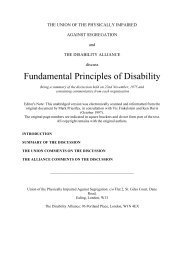Global-Report-Living-Colour-dr2-2
Global-Report-Living-Colour-dr2-2
Global-Report-Living-Colour-dr2-2
Create successful ePaper yourself
Turn your PDF publications into a flip-book with our unique Google optimized e-Paper software.
28<br />
Inclusive Communities = Stronger Communities<br />
GLOBAL REPORT ON ARTICLE 19: THE RIGHT TO LIVE AND BE INCLUDED IN THE COMMUNITY<br />
The parents were concerned about<br />
how the self-advocates would care for<br />
themselves and avoid harassment from<br />
the community.<br />
– Lesotho<br />
The other complicating factor in commenting on the role<br />
of family is that invariably, both families and individuals,<br />
reported that inadequate supports were being provided to<br />
families to assist in their role as primary caregivers to their<br />
sons and daughters.<br />
There are many situations where continued living at home<br />
is the preferred and typical choice, but this is possible only<br />
when adequate supports are provided. In many countries<br />
it is the general expectation that adult children will leave<br />
the family home upon reaching adulthood. This is not<br />
possible for people with disabilities if other options do not<br />
exist. In such situations, even in the presence of adequate<br />
home supports, choice is being denied.<br />
Families throughout the world told us that they do not<br />
deny their responsibilities for their family members,<br />
whether as a child or adult. They told us clearly that they<br />
do not wish to shift this responsibility to society or<br />
government. What they want – what they need – is<br />
support in fulfilling that responsibility. They need support<br />
that will provide for the health and well being of their<br />
family member and also their family.<br />
The lack of a welcoming community or of supports and<br />
services does not limit the responsibility for families to<br />
“contribute towards the full and equal enjoyment of the<br />
rights of persons with disabilities”. The growth of the selfadvocacy<br />
movement of persons who have an intellectual<br />
disabilities has demonstrated that many people who have<br />
an intellectual disabilities are very skilled at expressing<br />
their wishes and being much more independent than their<br />
families had ever believed. The focus groups of families<br />
and of people who have an intellectual disabilities showed<br />
the two sides of the coin of the right to autonomy and the<br />
need for support.<br />
When people are included in their communities and when<br />
supports are provided in very natural ways those supports



